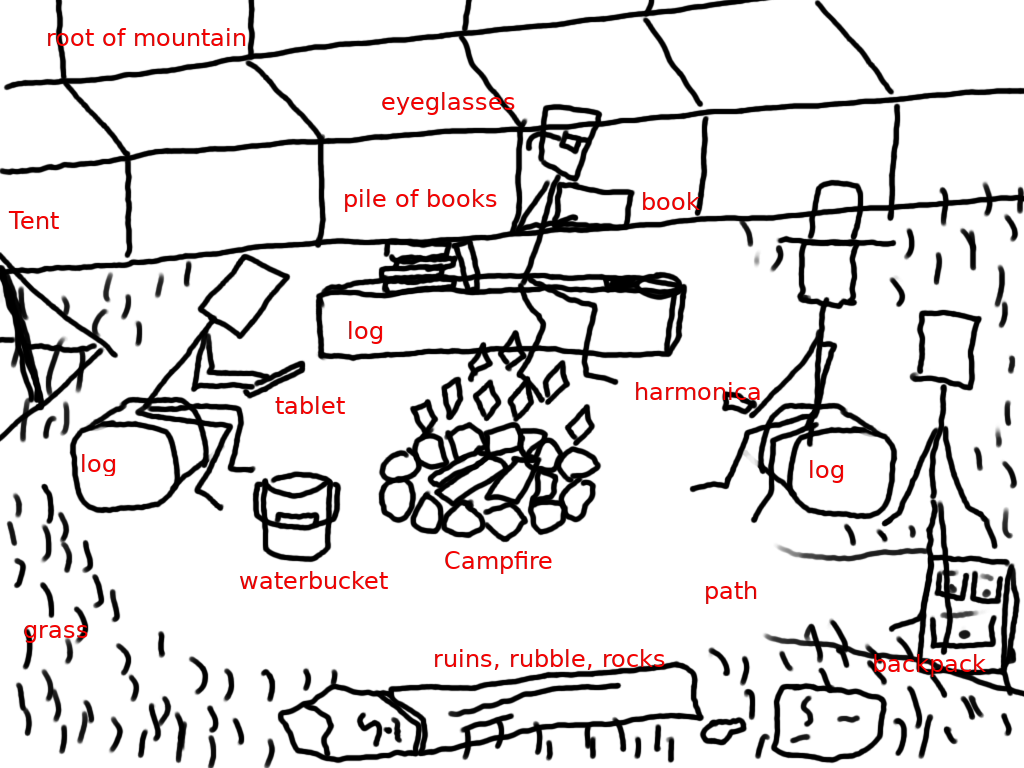
Death
I want to talk to you about a serious and grim subject: death in multiplayer games.
Death in games - multiplayer games in particular - has been one of the biggest unaddressed problems since the beginning of the industry. Many solutions have been tried, but there is no simple solution.
The problem is how to make death meaningful in a game?
Let’s consider this.
Game over... or is it?
Usually when you die in a game the game or the game session ends. And then you are free to start all over again. Some games force you to create a new character. In some games you can resume from right where you died. In some games you lose your items, money, experience or stats/skill points. In some games you cannot die at all. And in some games you have to wait before you are able to play again.
All of this tries to give death in a game a meaning in an environment where death has no meaning. And that is the big paradox.
The cost of death
I’ve been thinking about this question and trying to solve it for many years. It all comes down to that in an environment where death cannot have any real meaning, like it has in real life, we can only use metaphors - we have to make death a part of the game’s economics.
Death must have a cost.
If death has no price then it’s meaningless. You die, you respawn immediately and you’re back in the action. If death has no meaning then there’s no reason to have it. But that would make most of the games very boring.
Death has got to have a cost and it also needs to have value for the player.
Death in games is something against which you can test your skills. Are you good enough to do all those crazy things and not to die? It’s a delicate balance between having fun and having a really bad time. That is the value. It makes the challenge fun because you can fail.
But if the cost of dying is too high the players will simply quit the game.
And if the cost of dying is too low the players won’t be challenged enough and will quit the game after a while.
It also ruins the PVP if the cost is too low - unless you’re one of those people who consider statistics the fun part of the game, ie. “I’m better than you because I have more kills and less deaths.”
If you kill someone in a game and they immediately respawn then death is merely an annoyance at best and doesn’t have any consequences. It doesn’t have any consequences to the person who just died and it doesn’t reward the person who killed him - “I just killed you and you’re back here again?” What’s the point in that?
The currency of death
- Time/starting over.
- Stats/experience/skills.
- Items/money.
- Restrictions/handicaps.
This is all I can think of that can have a personal value for the player.
Starting over
In a game like Rituals of the old starting over is not a very good option. If we kill the player’s character and force him to make a new one nothing prevents him from living in the same house, having the same friends and using the same items he has gathered and stored away during his several consecutive lifetimes. We wouldn’t be able to punish the player in such a way that it would actually hurt him. The player would be just annoyed and would find the game tedious and repetitive.
Time
We could punish the player by taking away his time, ie. we would force him to wait before he can play again with the others. This approach somewhat works but it removes the player from the flow of the game and let’s face it - nobody likes to simply wait and do nothing. It just isn’t fun. Sure, it’s a punishment that works but it’s also alienating the player. And if he dies again right after his timeout? Several times? He will quit the game feeling very frustrated. Frustrate him enough and he will not play the game again.
Stats/experience/skills
You die and you lose some/all of your stats or experience or skills. This is very common in many games but it holds no value for the player playing the game. It’s just something that’s unavoidable for him. It’s motivational value is nonexistent. People will still kill themselves to get their food, drink and health full or to travel fast to the spawn point even if they lose some stats.
Items/money
Dropping your items when you die is the norm. It’s somewhat effective punishment, but it’s also what’s expected and doesn’t deter people from first storing their items in a safe place and then killing themselves to get their food/water/health full. They can just pick up their stuff when they respawn. This alone is not enough and doesn’t give death enough meaning.
Restrictions/handicaps
When you die you get restrictions placed upon you. It might be a recuperation time, injury you need to heal or something similar. The downside is that if you truly completely died, instead of say being knocked unconscious, then why are you injured when you respawn? It’s illogical. Also this brings you a world of hurt if someone is killing you repeatedly or you are in a situation where you would need to escape from the danger but can’t because you have restrictions placed upon you. Other than that this solution seems quite interesting to me personally.
Ideal solution
Ideal solution for me would be some combination of the above joined with some kind of an adventure. But the danger here is that the amount of content will eventually run out and it will start repeating itself. And even without repetition death might become a chore when all you’re really interested in is just playing the game. Perhaps it could be optional. You could just wait and you’d eventually get back into the game even if you’d do nothing.
Death versus unconsciousness
Do you really have to die? What if you’re just hurt really badly and knocked unconscious and then wake up badly injured? There is of course a world of trouble with this approach. What if you’re shot in the head? What if you fall in lava? What if you’re crushed under a ton of rubble?
Again I would find a combination of these two approaches to be the best. Also if you’re always just knocked unconscious there would be no rotting bodies left behind (rotting bodies in games are cool).
But if you die permanently why and how do you come back and where?
Mostly games approach this by just simply popping the players out of thin air and no one ever questions this because it’s just the way things are done. It’s just one of those things. But it doesn’t mean we have to accept it. Personally I think it’s bad for the continuity of the illusion of actually being in the game world. It completely breaks it up.
Respawning
- Popping out of thin air.
- You are a long lost relative of the person who died coming to collect your inheritance.
- You are a clone.
- You have been resurrected by magic/divine power/mysterious circumstances.
- You keep playing as your child.
- Your spirit/consciousness enters something.
I can’t think of anything else.
Popping out of thin air
*Pop*
-”But I saw you die!”
“DON’T ASK ANY QUESTIONS! WE SHALL NEVER SPEAK OF THIS AGAIN.”
Long lost relative
Most people like their game identities and this is a bit strange for the continuity. Someone else taking over someone else’s life.
You are a clone
This works very well actually if you are able to explain it from the lore/backstory point of view. And there would need to be a global system for the clone incubators. This is one of my favorites, but I’m not sure if it would fit well in the world of Rituals of the old.
Magic
It leaves the question who and why? Why does someone want you to live again? Are you special somehow? And everyone else is also special in the multiplayer game? I don’t like the concept of there being temples who resurrect people just for the hell of it or for payment (and what if you don’t have any money?)
Children
Your child steps into your shoes and takes over your life. What if you run out of children? Back to square one...
Your spirit/consciousness enters something
Leaves the question who are you since you can do this? And you would lose your identity to some extent. How would other people know it’s you? Doesn’t work very well in a multiplayer setting.
Final words
All of these options leave something to be desired. No one solution is perfect. If you’re willing to throw out all logic then you can just do what ever you like and probably since it’s so common no one would even raise and eyebrow.
But just because it’s common it doesn’t mean that I like doing things that way. I like it when things make sense.
Like I mentioned I’ve been thinking about this problem on and off for several years and this is all I’ve got. I don’t have any aces hidden up my sleeve.
If you have opinions/feedback/ideas, please let me know at our forums:
https://www.ritualsoftheold.com/community/
This article was updated on 21/10/18 @ 02:01
